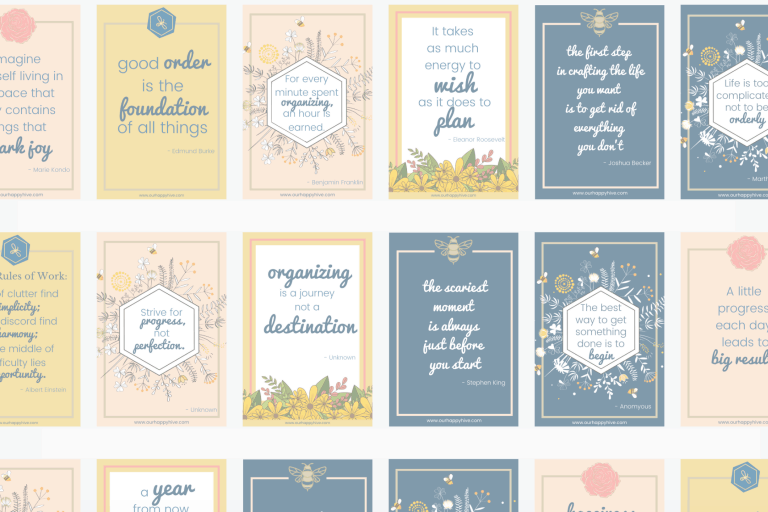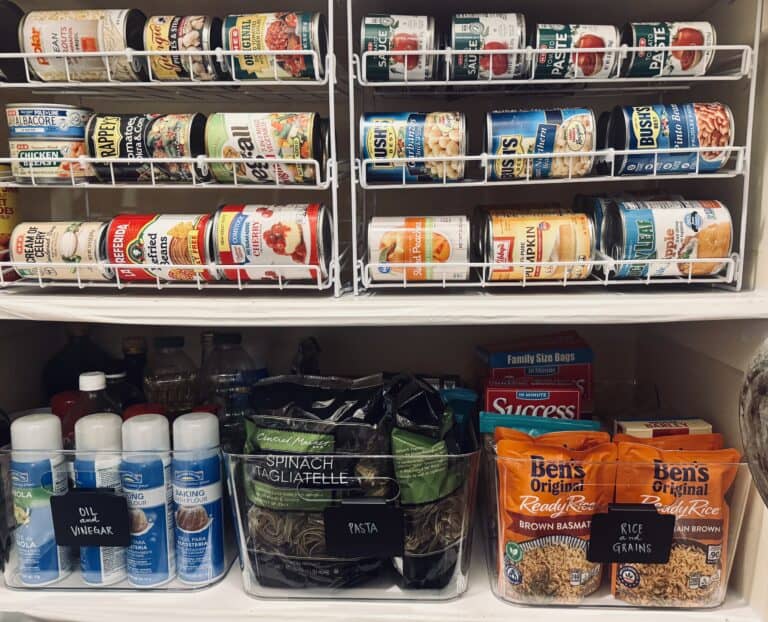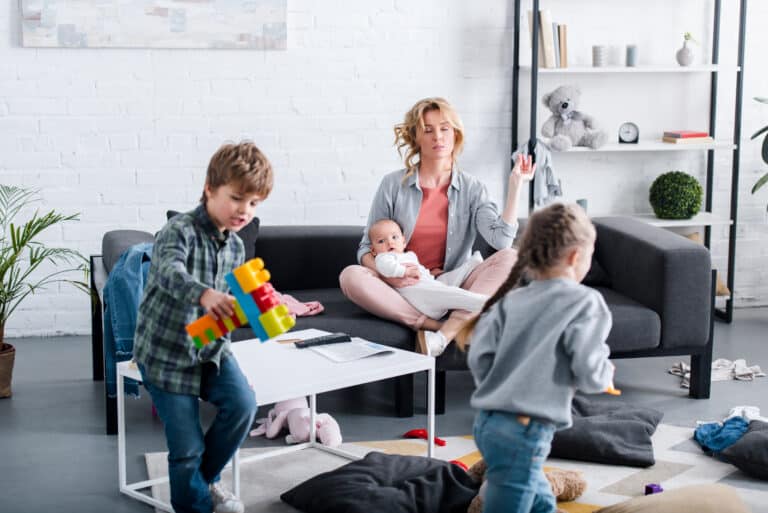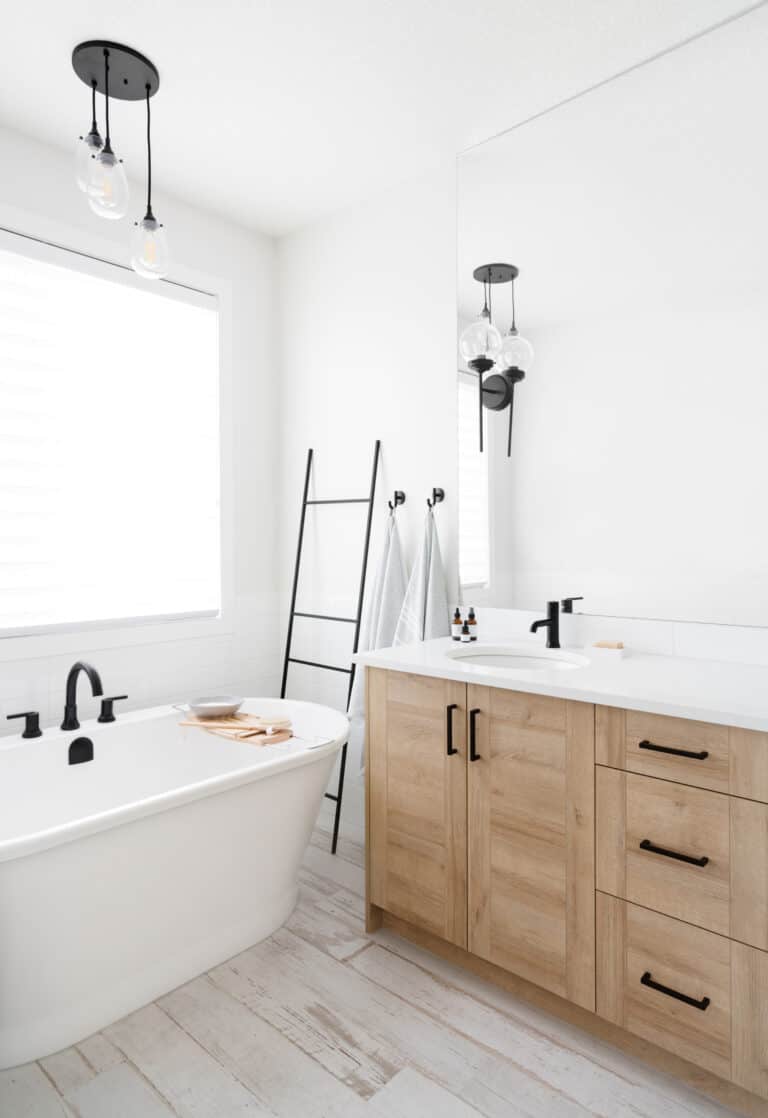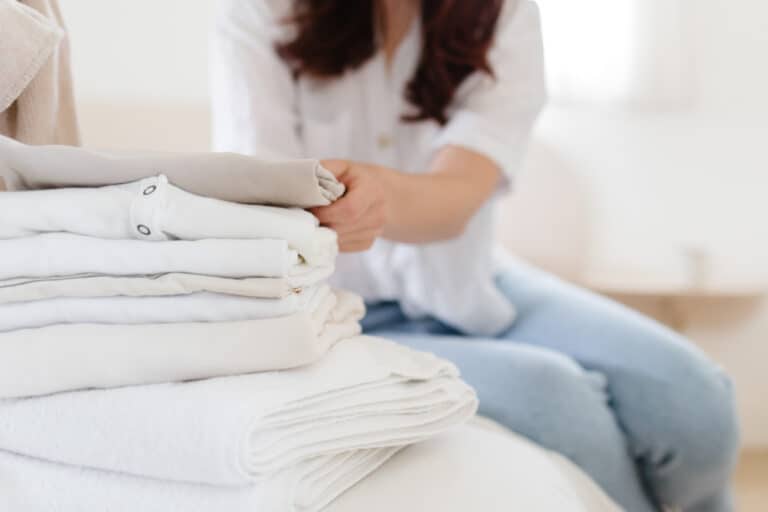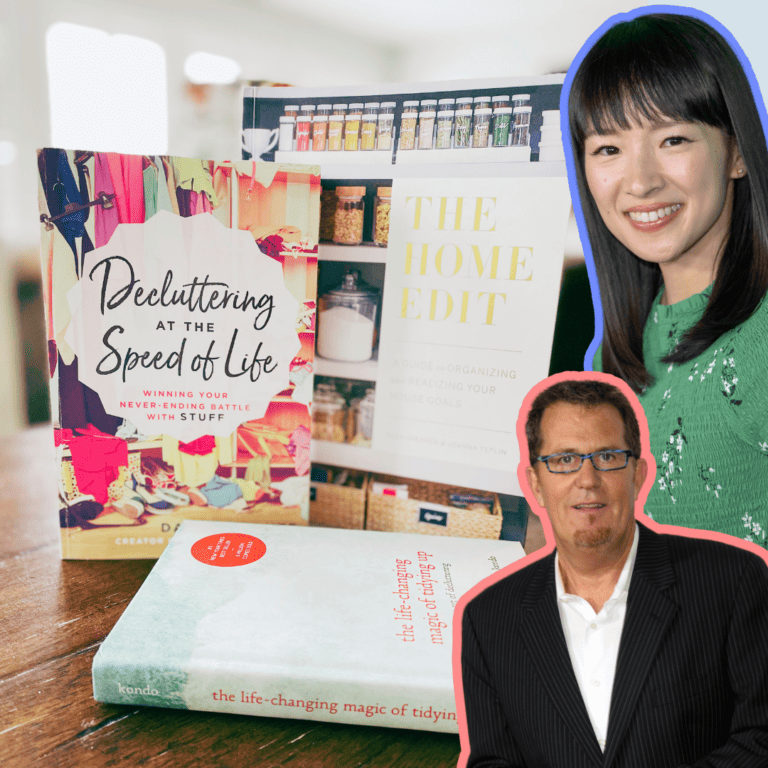Have you ever considered that we have a logical and emotional side to our brains? We deal with both sides when we try to declutter and face guilt for discarding and letting go of things that were once important to us. If we want to be successful in this endeavor, we need to know how to deal with decluttering guilt.
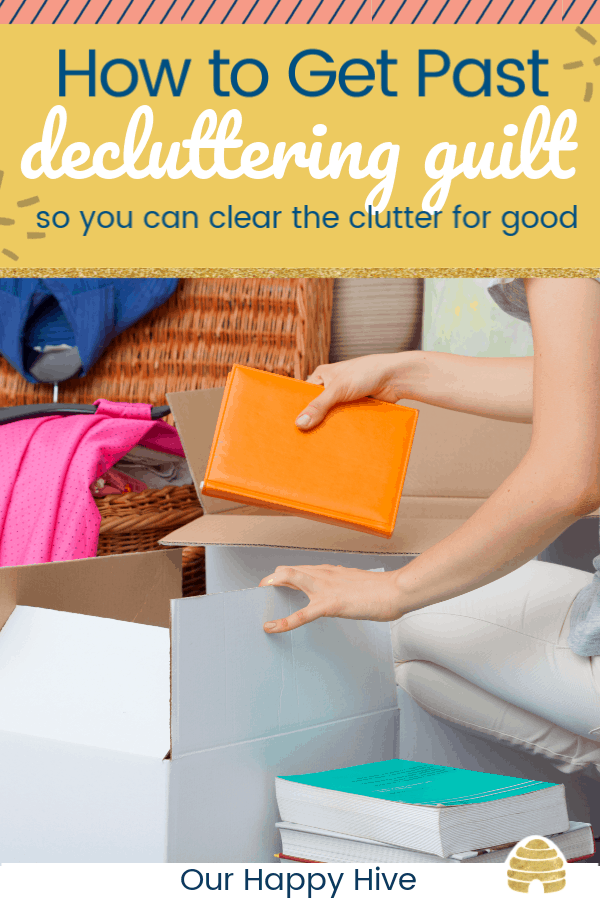
Emotional vs Rational
Recently, my two-year-old entered that phase…you know, the one that everyone talks about. He insists on having his own way, can be difficult to reason with, and becomes very focused (obsessed) on doing things by himself. I’ll admit, his obstinance has pushed me to the edge some days.
When researching how to parent him, I read a great article about how young kid’s brains are different than adult brains. They are basically 100% emotional and 0% logical. So, “reasoning” with them is ineffective. You have to appeal to their emotion.
Instead of saying to my toddler, “you need to ride in your car seat because it’s safer,” I say “I know you’re upset that you can’t stand up in the car while we’re driving…it’s fun to stand up isn’t it? I’m sorry you’re not happy.” I validate his feelings, speak in emotional language, and let him know that he’s been heard.
The same is true with adults at times. There are areas of our lives where we have to appeal to the emotional side and not just the logical side. Decluttering is one of those areas. If we merely look at decluttering from a rational perspective, then, we’ll face guilt when trying to get rid of things that are important and hold sentimental value.
In this post, we’ll look at strategies to deal with both sides of our brain, the emotional and the logical side, so that we can get past decluttering guilt and freely let go of things we no longer need.
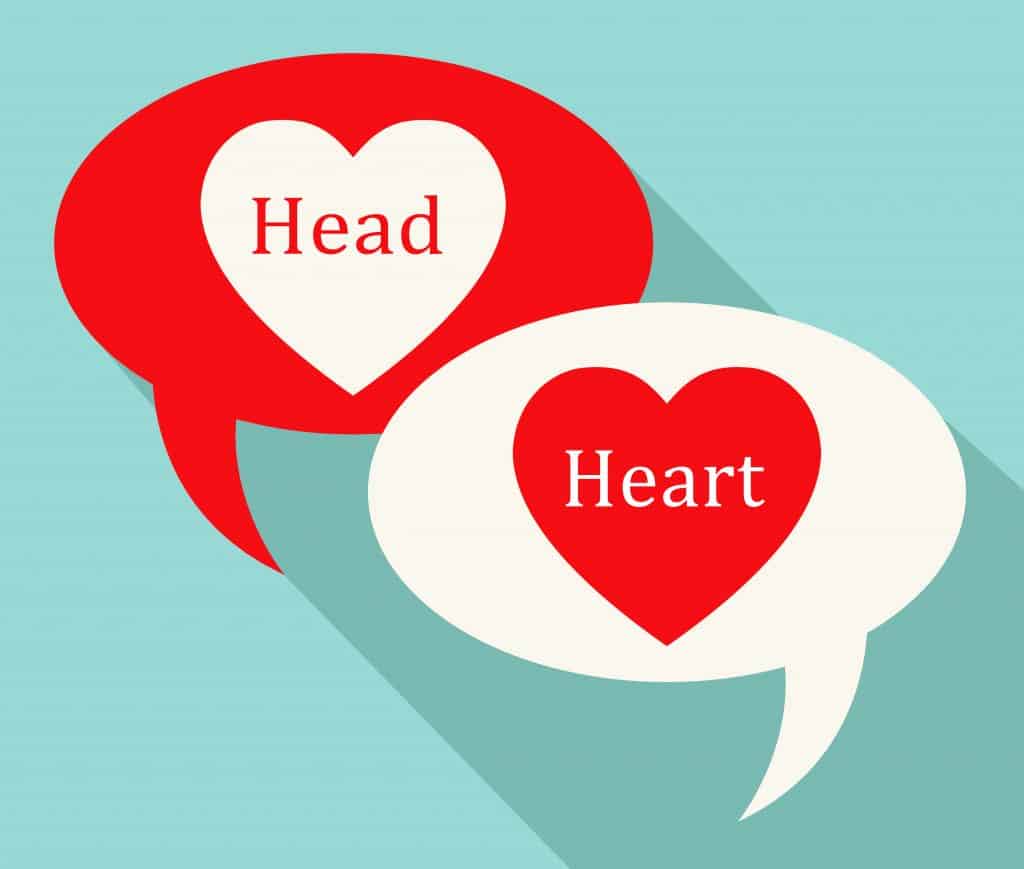
Emotional
Just like with my toddler, it’s not enough to just look at the cold hard facts like, Is the item worn out? or Do I use it? Sometimes we have to go deeper and we need to know our “why”
Understand Your Why
If there is an item you don’t use, don’t like, or is maybe even a bit worn and you are having trouble parting with it, examine your feelings about it. Ask yourself questions like:
- Why is this item important to you?
- Did the item cost a lot of money or was it something you worked hard to receive?
- When did you get the item? Or Who gave you the item?
- What meaning did it have for you when you acquired it?
- Why don’t you use the item now?
- What role does it play in your life now?
Once you understand your emotion associated with the item, try to speak to that need.
For example, this item is important to me because it belonged to my mom or my grandmother. Consider if there is another way you can treasure that memory like taking a picture of it, writing about the memory in a journal or keeping only part of the item?
As an example, I have part of my mom and my grandmother’s wedding dress, but not the entire dress. My Sister-in-law had a handkerchief made out of their garments. I carried that handkerchief at my wedding and now have it framed in a shadowbox on the wall. It’s not two full wedding gowns, but it is a paired down piece of each of our special days.
Bottom line, to address your emotional side, recognize your “why” – acknowledge it. Give it permission, then appreciate that there are other ways you can value its memory.
Logical
Unlike a young child, adults can reason with themselves and use logical information to address emotional needs. The next group of recommendations takes more of a logical approach, they can help reduce guilt and speak to your emotions!
Change Your Perspective
Many times, we need to simply tweak our perspective to allow ourselves to move on. Consider the following.
- The things you have a hard time letting go of, are you really doing them justice by burying them deep in your closet or storage area…putting them on a shelf and never using them?
- What if there was a way it could be used and brought back to life again? Envision the item you love being used by someone else who loves it and was looking for that very thing.
Consider Your Own Life
True confession, I don’t hold onto my kids’ artwork. There’s just so much paper that accumulates every single day. At times, I feel a little bad about it or should I say guilty, but then, I consider my own life. My husband and I have a few items from our childhood, but definitely not every piece of artwork. And guess what, we don’t miss them. Honestly, there hasn’t been one day where I thought, “man, I wish I could see a drawing that I did when I was 5 years old.”
I don’t think we’re alone in this. If you’re tempted to hold onto something for your kids or even yourself, consider if you will really miss it when it’s gone.
Find a New Home
It’s easy to feel guilty if you think your once-treasured item is just going to another junk pile or worse a landfill. By identifying a person or organization that can put to use the things you’re getting rid of, you’ll feel much better about your decision. Make a point to identify:
- A family that can use your kid’s hand-me-downs
- An organization that can use old toys or children’s gear
- A food bank that takes unopened packages of food
- A school, church, or library that accepts books
Give Yourself Permission
Some of the time, all we really need to do is to give ourselves permission to let go of something. As a really practical person, I felt I could only get rid of things that were worn out, didn’t fit, or didn’t work anymore. After reading Marie Kondo’s Life-Changing Magic of Tidying Up, I added new criteria…if it didn’t bring me joy, I could get rid of it. It gave me permission to get rid of things that didn’t fit my preconceived ideas.
You may be tempted to hold onto something because it was a gift. If it’s not something you love, then you don’t need to hold on to it. Consider this your permission to move on!
Look at the Big Picture
Finally, if you’re still struggling with guilt, take a step back and look at the big picture. What happens if you hold onto everything that passes through your hands?
- You run out of space
- Have to rent extra storage
- It makes it difficult to find and use the things you truly do value
- Cleaning becomes more difficult
- And at some point, you or someone else will have to go through all of it. If you don’t take responsibility, then it will eventually be put on someone else.
In our consumer-based society, we need to regularly purge and declutter our home. Things may serve a purpose for a season, but then they can go on to the next person that needs them. You can cherish memories without the actual possession. You can honor a friendship without holding onto the gift.
Many times, we keep something because we think someone else wants it. Maybe we keep something because it was given to us by our mom and we think she’ll be really disappointed if we don’t keep it. Other times we save things for our kids hoping they will want it. You can find a new home and bless someone else with your gently used items. Don’t save too much stuff for the next generation. Research shows they don’t really want it anyways. Give yourself permission to let go and move on!


